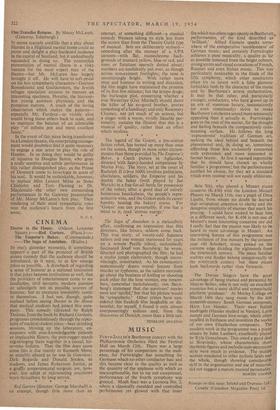attempt, at something different—a musical comedy Western taking its style
less from the screen than from the Theatre Guild type of musical. Sets are deliberately stylised— something after the manner of a UPA cartoon—with flat, monochrome back- grounds of mustard yellow, blue or red, and trees or furniture sparsely dotted about; numbers are confidently put over, as though across non-existent footlights; the tone is unremittingly bright. With rather more snap and humour in writing and direction, the film might have maintained the promise of its first few minutes; but the tempo drags; the burlesque plot, concerning whether a true Westerner (Guy Mitchell) should shoot the killer of his no-good brother, proves something of a handicap; and only Rosemary Clooney, not yet much of an actress, but a singer with a warm, vividly likeable per- sonality, sustains the illusion that this is a musical of quality, rather than an effort which misfires.
The legend of the Golem, a pre-science fiction robot, has turned up more than once on the screen, though in more sober circum- stances than those provided by The Emperor's Baker, a Czech picture in Agfacolor, directed with heavy-handed competence by Martin Eric. The story, set at the court of Rudolph II (circa 1600) involves politicians, charlatans, soldiers, the Emperor and his double the baker (both played by Jan Werich) in a free-for-all battle for possession of the robot; after a good deal of naively boisterous knockabout, the people's repre- sentative wins, and the Golem ends its career humbly heating the bakery ovens. For 'Golem' one can presumably, if one has a mind to it, read 'atomic energy.'
The Saga of Anatahan is a melancholy affair, confirming an impression that film directors, like boxers, seldom come back. This true story, of twenty-odd Japanese sailors• and one woman marooned for years on a remote Pacific island, undoubtedly fascinated Josef von Sternberg; he wrote, directed and photographed the film; he had a studio jungle elaborately, though uncon- vincingly, constructed. As his commentary sententiously draws moral lessons from murder or typhoons, as the sailors morosely go about the business of knifing or shooting each other for the lone woman, one remem- bers, somewhat incredulously, von Stern- berg's statement that .the survivors' stories were too 'sordid,' but that his picture would be 'sympathetic.' Other critics have con- sidered this freakish film laughable or dis- tasteful; for myself, I found it only almost overpoweringly tedious and, from the discoverer of Dietrich, more than a little sad.


































 Previous page
Previous page